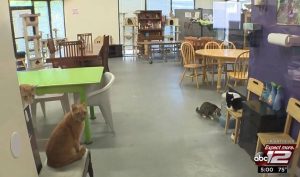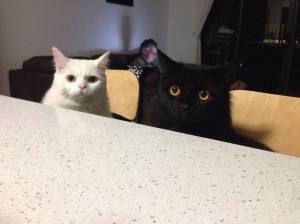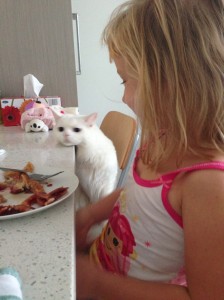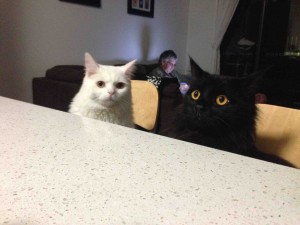I was walking Ted the Wonder Dog the other morning — which I try to do every day but often fail because I’m human, dammit, and Ted would rather sleep beside me all day, and then party at 2 a.m. — and we passed the new cat café in Annerley, Brisbane.
 I never had indoor cats until the townhouse rules in Brisbane forced us so. Same with the tiny dog. Now we have our own inner city million-dollar property (in Monopoly money) the cats go in and out, and the dog won’t shut-up.
I never had indoor cats until the townhouse rules in Brisbane forced us so. Same with the tiny dog. Now we have our own inner city million-dollar property (in Monopoly money) the cats go in and out, and the dog won’t shut-up.
Cuteness overload was supposed to be the number one item on the menu at San Antonio’s first cat cafe, but now the owner is facing an investigation from local authorities.
City of San Antonio Animal Care Services seized two cats last week and ordered the remaining 54 cats in the 1,000-square-foot San Antonio Cat Cafe to be quarantined from the public on Monday, according to WOAI.
“You are not going to get the sick cats better in that environment and unfortunately you are likely to spread those ailments to the other animals that are currently healthy,” Shannon Sims, the assistant director of Animal Care Services, told the station.
The ailments that he’s talking about allegedly include ringworm and FIP, a viral disease that tends to attack the cells of the intestinal wall and is usually fatal in domestic cats, according to WebMD. Animal Care Services spokeswoman Lisa Norwood told KENS that the investigation thus far had revealed that up to three dozen cats that did not have rabies shots and that sick cats were often mixed with healthy cats.
 Leah Taylor, a former cafe employee, who is studying to become a veterinary technician, told KENS she filed a complaint against owner Casey Steuart with Animal Care Services after witnessing four cats die there during her four months on the job.
Leah Taylor, a former cafe employee, who is studying to become a veterinary technician, told KENS she filed a complaint against owner Casey Steuart with Animal Care Services after witnessing four cats die there during her four months on the job.
“A lot of the cat care wasn’t maintained,” Taylor told KENS. “There were animals that should have been on medicine. There were animals that needed to see a vet for medical attention that weren’t tended to. There was a lot of ringworm and upper respiratory, which is very contagious not only to people but also to other animals.”
Cas Moskwa, another former Cat Cafe employee, posted a series of photos on Facebook Sunday, detailing what she called “the reality of the cafe and the poor state it currently is in.” She claimed that Steuart waited for weeks at a time before taking sick cats there to a veterinarian and left at least one sick and dying cat, named Decoy, out in the public lounge during his last agonizing days.
 Her post includes photos of cats with crusted eyes and allegations that Steuart brought in a cat infected with ringworm into the facility’s kitten coop, resulting in three different litters becoming infected. She said in a separate post that a cat she took home from the cafe was one of them that had been infected.
Her post includes photos of cats with crusted eyes and allegations that Steuart brought in a cat infected with ringworm into the facility’s kitten coop, resulting in three different litters becoming infected. She said in a separate post that a cat she took home from the cafe was one of them that had been infected.
According to KSAT, though, Steuart disputes the reports from Moskwa and other former employees, blaming “a lack of communication and misinterpretations.” She specifically disputed the reports of ringworm, a skin infection that can be transmitted to humans, in the cafe.
She also told the San Antonio Express News that three cats did die at the cafe, but none from neglect. One, she said, was 17 years old.





 where people can enjoy the healing effects of being surrounded by animals such as dogs, birds, goats and rabbits.
where people can enjoy the healing effects of being surrounded by animals such as dogs, birds, goats and rabbits..jpeg) staff member possessing an animal health technician license or other such qualification.
staff member possessing an animal health technician license or other such qualification.